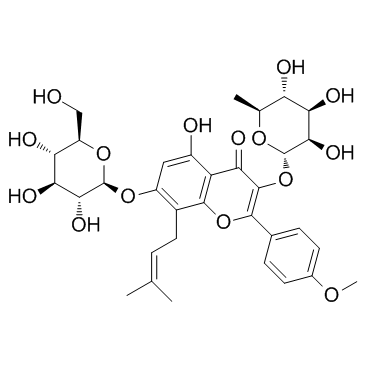Icariin promotes bone formation via the BMP-2/Smad4 signal transduction pathway in the hFOB 1.19 human osteoblastic cell line.
Wenna Liang, Munan Lin, Xihai Li, Candong Li, Bizheng Gao, Huijuan Gan, Zhaoyang Yang, Xuejuan Lin, Linghong Liao, Min Yang
文献索引:Int. J. Mol. Med. 30(4) , 889-95, (2012)
全文:HTML全文
摘要
Icariin, the main active compound of the traditional Chinese medicine, Epimedium, is commonly used for the clinical treatment of osteoporosis. However, the precise molecular mechanism of the therapeutic effect of icariin has not been elucidated. The aim of this study was to examine the effect of icariin on cell viability, alkaline phosphatase (ALP) activity, the amount of calcified nodules, and to delineate the molecular mechanism of icariin-enhanced bone formation by investigating the expression of bone morphogenic protein-2 (BMP-2), Smad4, Cbfa1/Runx2, osteoprotegerin (OPG), receptor activator of nuclear factor κ-B ligand (RANKL) and the OPG/RANKL ratio in the hFOB 1.19 human osteoblastic cell line. We found that icariin significantly increased the cell viability, the activity of ALP and the amount of calcified nodules in the hFOB 1.19 cells. Furthermore, we observed that icariin upregulated the expression of BMP-2, Smad4, Cbfa1/Runx2, OPG, RANKL and the OPG/RANKL ratio. Our results indicate that icariin can modulate the process of bone formation via the BMP-2/Smad4 signal transduction pathway in hFOB 1.19 cells.
相关化合物
| 结构式 | 名称/CAS号 | 分子式 | 全部文献 |
|---|---|---|---|
 |
淫羊藿苷
CAS:489-32-7 |
C33H40O15 |
|
Icariin promotes histone acetylation and attenuates post-str...
2013-04-16 [Neuroscience 236 , 281-8, (2013)] |
|
High-performance liquid chromatography-based multivariate an...
2012-01-01 [Biosci. Biotechnol. Biochem. 76(5) , 923-7, (2012)] |
|
Inhibitory effect of icariin on Ti-induced inflammatory oste...
2014-12-01 [J. Surg. Res. 192(2) , 447-53, (2014)] |
|
The beneficial effect of Icariin on bone is diminished in os...
2012-07-01 [Bone 51(1) , 85-92, (2012)] |
|
Icariin: a potential promoting compound for cartilage tissue...
2012-12-01 [Osteoarthr. Cartil. 20(12) , 1647-56, (2012)] |